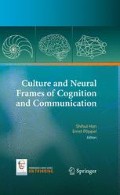Abstract
It is argued that in human thinking there exist two basic modes of connecting mental content. One is the rather well-understood and well-formalizable “ratio-morphic concatenation” (RMC). This mode corresponds to the factual aspect of reality and it lends itself for precise analysis. Most of the history of “logic” focused on this mode of thinking. There also exists, however, a second, phylogenetically much older, less precisely definable mode of connecting mental content. For this mode, the notion “logic of constellations” (LOC) is introduced. LOC has hitherto often been addressed with black-box concepts such as “intuition” or “gut feeling”. Taking LOC seriously as a second mode of thinking in its own right implies starting to ask about its internal structures and processes. Analyzing LOC in this way shows that it is composed of three distinguishable sub-dynamics. Firstly, there is a process in which the different components of a constellation interpret each other mutually, and thus unfold their specific meaning in their actual constellation. Secondly, there emerges, out of all these “bilateral” processes of semantic unfolding, a global, overarching “picture” or “meaning”. This emergent “big picture” is meaningful, but never well-defined. Thirdly, the overarching picture starts to impact – in a kind of top-down re-interpretation – on its own constituents and sharpens their meaning once again. These three sub-dynamics together constitute the LOC. LOC is complementary to RMC, and it is essentially an asymptotic, i.e., never completely finished, and thus never well-defined process of “semantogenesis”. LOC is important because it allows us to address the actual taking place of reality in the time–space of the present. This actual taking place of reality is an aspect of reality in its own right, complementary to the factual aspect of reality for which RMC is the appropriate mode of thinking. Insight into the existence as well as into the internal structures and dynamics of LOC has implications for a very broad range of issues, i.e., for all issues that are characterized by strong self-referentiality and autogenesis. These issues range from foundational topics in science, like the famous “measurement problem” in quantum physics or the emergence of life and subsequently consciousness, to the perception of sense and meaning. But it is argued that LOC is equally important for understanding how art and creativity work, and for insightful, responsible decision making despite “objective uncertainty”, i.e., in coping with an open, undetermined future.
Access this chapter
Tax calculation will be finalised at checkout
Purchases are for personal use only
References
Filk T, von Müller A (2009) Quantum physics and consciousness: the quest for a common conceptual foundation. Mind Matter 7(1):59–80
Filk T, von Müller A (2010) A categorical framework for quantum theory. Annalen der Physik (Berlin) 522, WILEY-VCH Verlag Weinheim 11:783–801
von Müller A (2010) Thought and Reality. In: Glatzeder B, Goel V, von Müller A (eds) A philosophilcal conjecture about some fundamental features of human thinking. Springer, Heidelberg, pp 59–70
Author information
Authors and Affiliations
Corresponding author
Editor information
Editors and Affiliations
Appendix
Appendix
Prof. Dr. A. von Müller is director of the Parmenides Center for the Study of Thinking and teaches philosophy at the Ludwig-Maximilians-University of Munich (LMU) and theory of thinking at SISSA (International School for Advanced Studies, Trieste). His two main fields of interest are the phenomenon of thinking and the concept of time. After a Ph.D. on “Time and Logic” at the University of Munich he worked for many years in the Max Planck Society, taught in parallel at the University of Munich, and was subsequently director of EUCIS (European Center for International Security). He developed the visual reasoning methodology “Eidos” that supports complex thinking and decision making processes and served as scientific advisor to several governments and large companies. Von Müller is co-founder of the European School of Governance, Berlin, and external member of two multidisciplinary research centers at the University of Munich, the Human Science Center and the Munich Center for Neuro sciences, and he is member of the board of trustees of the Max Planck Institutes of Neurobiology and Biochemistry. He co-edits the Springer book series “On Thinking” and pioneers the MCA (magister cogitationis artium), an alternative to the traditional MBA that will focus specifically on advanced skills of authentic thinking, as needed when confronted with unprecedented challenges and uncharted waters.
Rights and permissions
Copyright information
© 2011 Springer-Verlag Berlin Heidelberg
About this chapter
Cite this chapter
von Müller, A. (2011). The Logic of Constellations: A Complementary Mode of Thinking that is Crucial for Understanding How Reality Actually Takes Place. In: Han, S., Pöppel, E. (eds) Culture and Neural Frames of Cognition and Communication. On Thinking. Springer, Berlin, Heidelberg. https://doi.org/10.1007/978-3-642-15423-2_13
Download citation
DOI: https://doi.org/10.1007/978-3-642-15423-2_13
Published:
Publisher Name: Springer, Berlin, Heidelberg
Print ISBN: 978-3-642-15422-5
Online ISBN: 978-3-642-15423-2
eBook Packages: Biomedical and Life SciencesBiomedical and Life Sciences (R0)

